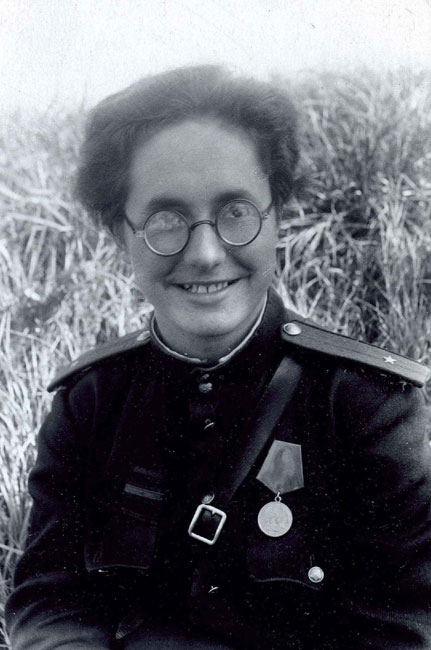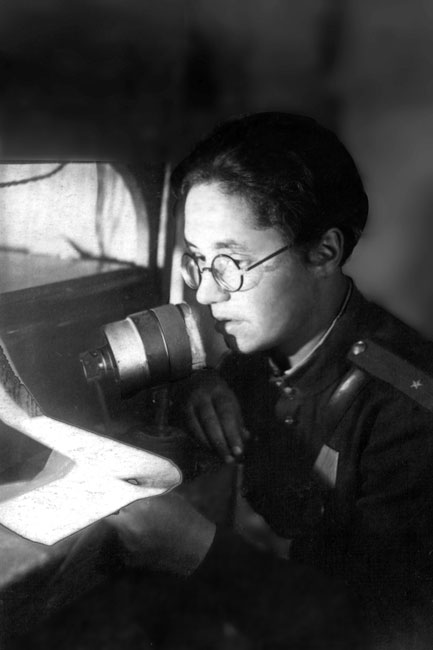Irina Dunaevskaia was born in Leningrad in 1919. Her mother Gita Dunaevskaia was one of the first women in Russia to be an engineer. In 1937 Irina became a student at the Philology Faculty of the Leningrad State University, studying Russian, German, and Semitic languages, including ancient Hebrew. When the war between the Soviet Union and Nazi Germany broke out on June 22, 1941, with her husband Vladimir Gratsianskii, Irina joined a unit of the narodnoe opolchenie(the people's militia) in Leningrad. After the death of her husband at the front in September 1941, Irina volunteered to join the Red Army but she was rejected. She stayed with her mother in besieged Leningrad, continuing to study at the University and volunteering as a nurse at one of the city's hospitals. Finally, in April 1942 Irina Dunaevskaia was drafted into the Red Army, where she served as a military translator from German with an infantry division. During the war Irina served on the Leningrad, Baltic, and Belorussian Fronts, and ended the war in eastern Germany. As a translator from German with military intelligence, Dunaevskaia interrogated German prisoners of war, translated and scanned various documents (including German ones captured by the Soviets), collecting information about the deployment of German troops, etc. She also took part in Soviet propaganda and counter-propaganda, broadcasting in German and preparing leaflets for Wehrmacht troops in order to encourage them to surrender. In 1943 Dunaevskaia was awarded the For the Defense of Leningrad Medal and on January 25, 1944 - the Combat Merit Medal. During her military service Irina Dunaevskaia kept a diary which documented in detail her life as a military translator and as a woman in the Red Army. She did not mention items of Jewish concern except for several antisemitic experiences involving some Soviet commanders. For example, on February 1, 1945, when she was in Germany, she described the following incident that occurred in the central square of Peischtendorf, when a drunken Soviet major tried to attack her:
"… on my way to the captain's car … I was crossing the central square with him. Suddenly there … appeared … a [Soviet] major drunk out of his mind …. He… confronted us and, fixing his whitened mad-white eyes on me, shouted some ugly antisemitic words, threatening to hit me in the face. Of course, he was totally drunk, but feeling in danger…. I pulled out my pistol and succeeding in firing one shot before the captain who was accompanying me finally began to react …. Fortunately, my shot was high…."
In June 1945, shortly after being demobilized, Irina Dunaevskaia was awarded the Order of the Red Star. In 1948 she graduated from Leningrad State University in German linguistics and then taught German in high schools. After receiving a PhD for her dissertation on the Hittite language in 1959, Dunaevskaia served until her retirement in 1976 as a senior research fellow at the Leningrad campus of the Institute of Oriental Studies of the Russian Academy of Sciences. She published more than 40 scholarly works.
Irina Dunaevskaia died in 2014 in St. Petersburg.
Entry from Irina Dunaevskaia's diary
In her diary Dunaevskaia notes another example of antisemitism that she experienced. On July 29, 1944 Irina happened to overhear a phone conversation between her commander Captain Andrei Korzhavin, whose romantic advances he had rejected, and a switchboard operator:
"Early in the morning I picked up the receiver of the field phone. I heard Korzhavin speaking with the telephone operator. He exaggerated my [Jewish] pronunciation of the letter 'r', thus alluding in a contemptuous way to my nationality, by the way he said the 'control' word 'corn' [kukuruza in Russian] …. I broke into the room from which Korzhavin was continuing his conversation in the same vein and slapped his face."
Irina Dunaevskaia, Ot Leningrada do Kenigsberga: Dnevnik voennoi perevodchitsy 1942 - 1945 (From Leningrad to Königsberg: The Diary of a War Translator, 1942-1945), Moscow, 2010 (Russian).








